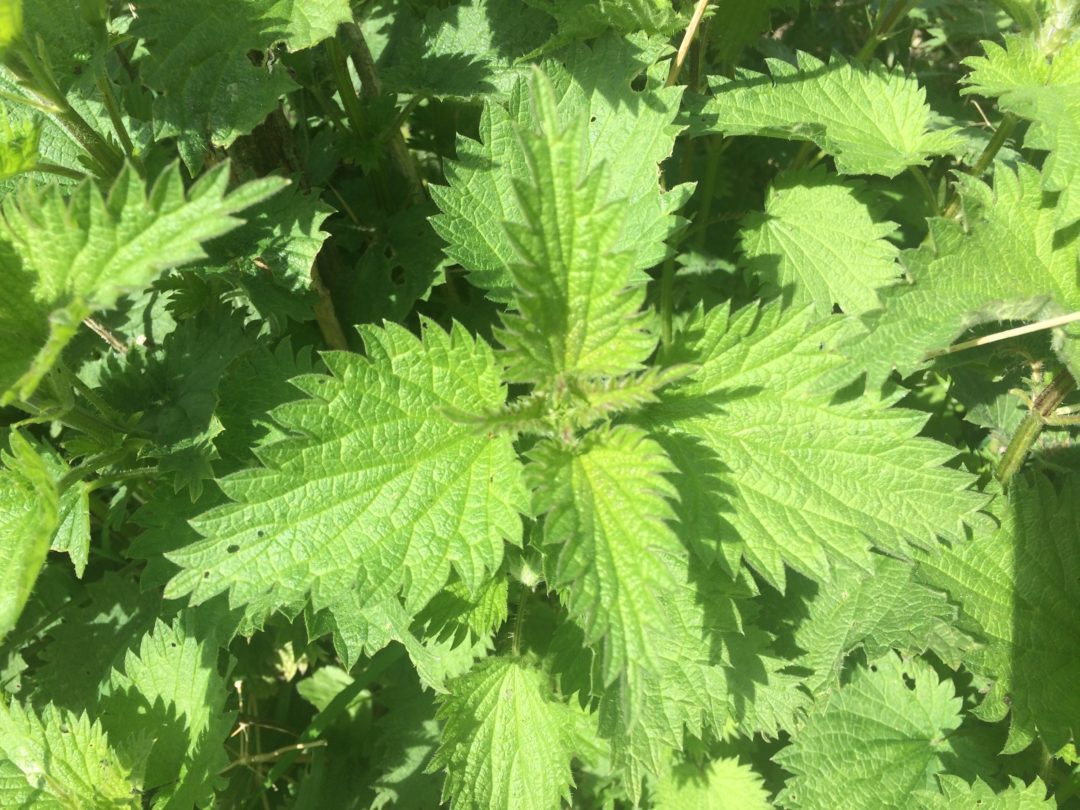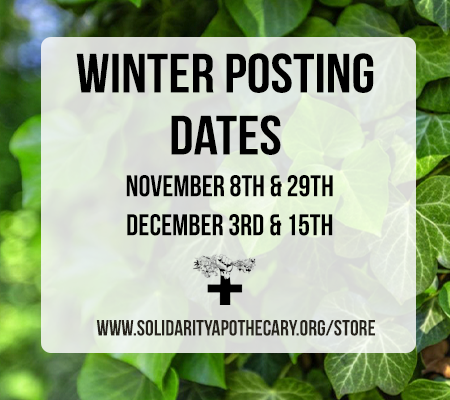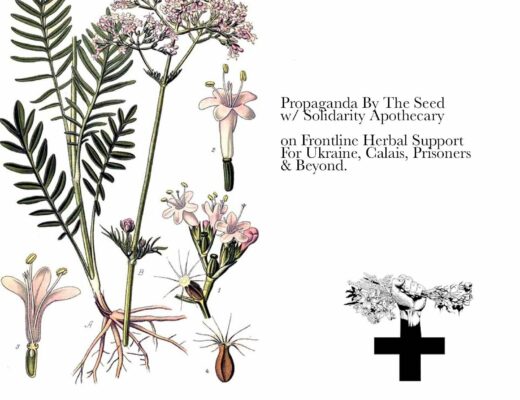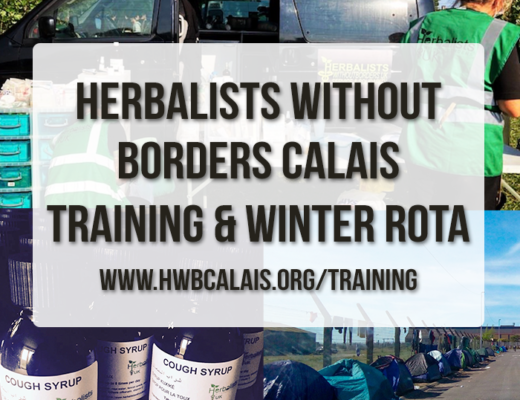Please note these plant profiles are a work in progress. I will always be adding to them as I keep learning about the amazing world of plant medicine.
Botanical Overview
Latin name: Urtica dioica
Plant family: Urticaceae
Identification: Broad oval to heart-shaped leaves, stalked, coarsely toothed leaves 4-8cm long in opposite pairs up the upright stem.
Other species: Urtica urens (small nettle)
Folk names in English: Stinging nettle, wild spinach, hoky-poky, hidgy-pidgy, devil’s leaf. In Latin “uro” means to burn. Dioica is derived from Greek, meaning ‘of two houses’ (having separate staminate and pistillate plants; dioecious)(1).
Chemical constituents
- Aerial parts: Amines, histamine, choline, acetylcholine, serotonin, and 5-hydroxytryptamine; acids including ascorbic; flavonoids including qercetin; glucoquinone; minerals including calcium, potassium, iron, magnesium; silicic acid
- Roots: Phenols; plant sterols including stigmast-4-enzone and stigmasterol
- Seeds: Fatty acids including palmitic, stearic, oleic, linoleic, eicosanoic (2)
Food and nutrition
Nettles are incredibly nutritive. They are rich in vitamins C and A, iron, magnesium, calcium, chromium, zinc, potassium, phosphorous and silicon. The iron in nettle is very easily absorbed and assimilated. The tops are edible. Nettle is also made into beer. Nettle soup, pesto and nettle curry are common recipes.
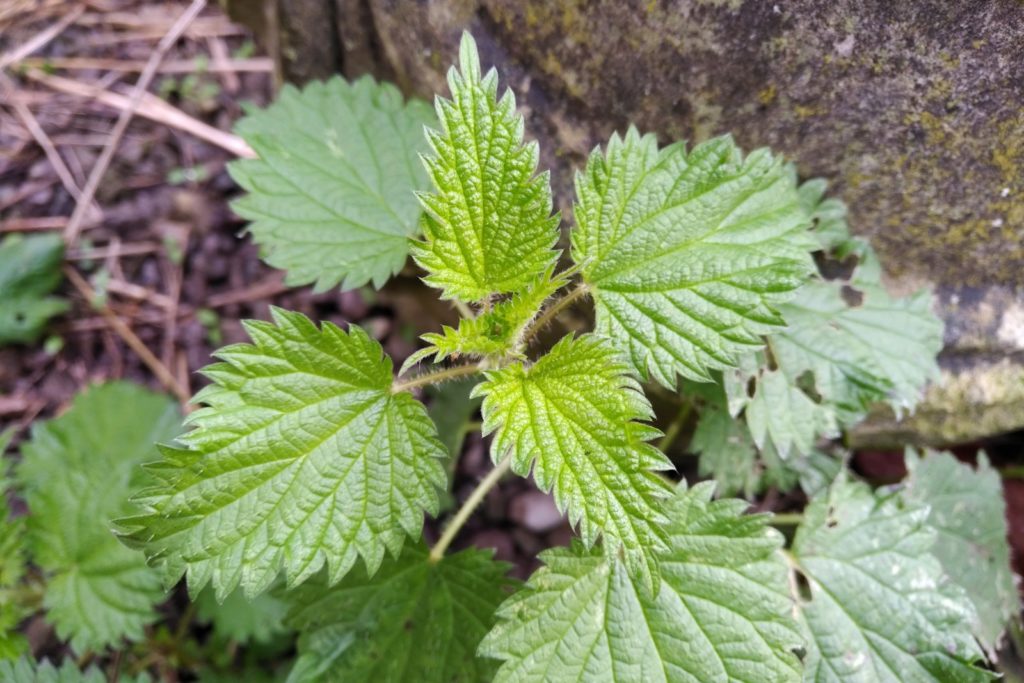
Ecological role
Nettles grow on mostly damp and moist soils, especially where nitrogen or phosphate-rich. Nettles can commonly be an indicator of eutrophication e.g. Where there is runoff from fertility, or where grazing animals urinate regularly (4). Nettles also commonly grow with cleavers. Nettles can be found in woods, scrub, brambles, bracken, and patches in fields, as well as on disturbed ground in urban areas. Nettles make an excellent addition to hot composting batches.
Other uses: Gabrielle Hatfield describes how nettles have been used since at least the Bronze Age for making cloth and cord, referencing the saying “Devil used nettles in May to make his shirts” (5). In addition, Nettles have been used as hair tonics.
Cultivation: Unnecessary! If you did want to plant or introduce them to your garden then simply sow seed onto moist soil. They will soon grow and spread.
Energetics
- Temperature: Cool
- Moisture: Dry
- Tissue State: Cold/Depression, Damp/Stagnation
- Taste: Salty and sweet
Health challenges supported by Nettles:
As a spring tonic and diuretic: In their ethnobotanical research of the British Isles, David E. Allen and Gabrielle Hatfield found that two-thirds of records for nettles describe their use as a ‘spring tonic to cleanse the blood of impurities (6)’. While ‘spring tonic’ is a vague term, nettles are valued for their alternative action. Herbalist Sajah Popham describes alterative remedies as those that open up the channels of elimination of the body, facilitate the expulsion of waste products, and adjust or “alter” the metabolic functioning of the body (7).
These alternative actions also mean that nettle can support folks with chronic skin conditions, arthritic pains, gout and edema. Many of these are associated with the energetic perspective of ‘damp accumulation’. Sajah says nettles also have a ‘solid influence on hypothyroidism’ at least, symptomatically. Herbalist Zoë Hawes remarks that the Romans used their sting to stimulate circulation in their extremities when faced with the cold weather in Britain (8). Likewise, it’s common in many cultures to flog oneself or others with nettles due to their stimulating effect on the circulation.
As a nutritive: Due to its vitamin and mineral rich content, nettles are often recommended for folks recovering from chronic illness or injury or just general weakness. Their relative safety means that many people consume them daily in the form of nourishing infusions. They can also be taken as decoctions and integrated into the diet in diverse ways (see nutrition section above). Nettles can also be infused into vinegar as a great fast way to access their abundance of minerals. For many health needs, tinctures are recommended from the fresh plant material.
Nettles are an amazing ally for folks with anaemia and blood deficiency. Sajah describes nettle’s power: “not only by providing baseline nutrients to build the blood but also through supporting the liver in the building and recycling of blood. This building of the blood makes it one of our chief remedies for low blood pressure as well, indicated by paleness, weakness, dizziness upon rising, low energy, mental fog and dullness, and overall poor nutrition to the heart.”
Supporting the kidneys: Kidney failure can be fatal and any kind of kidney-related issues like kidney disease need serious, ongoing medical attention and care. Herbally, nettles are a kidney trophorestorative. Sajah describes how the seeds have been so strong as to get people off dialysis. Nettles can also support the adrenal glands which sit on top of the kidneys. They can have a stimulatory effect and so are better used when folks are incredibly burnt out and exhausted, where they can have more of a restorative effect.
Prostate support: Nettle root is a very well-researched remedy for the prostate. Sajah says it has been studied rather extensively in its capacity to reduce swelling of the prostate associated with BHP (Benign Prostate Hyperplasia). Nettles have also been used for impotence.
Seasonal allergies: While not addressing the cause of allergies, nettle can offer symptomatic relief. People can either consume dried extract in capsules quite frequently or folks can drink a lot of a very strong decoction. Due to its drying action, it can definitely help with dripping noses, as well as with redness, itchiness and swelling in the face common to hay fever.
Uterine tonic: For pregnant folks, nettle can provide optimum nutrition. It is also a powerful ally post-childbirth where it can astringe any bleeding. It can also be used to help address spotting between periods for folks who menstruate. Nettle can also stimulate lactation for people who are breastfeeding.
For diarrhoea and the digestive system: Nettles’ astringent action can support people with chronically loose stools. They can also support people suffering with infectious diarrhoea. Nettle’s toning action on tissues has also led to its use for people with leaky gut syndrome. It has even been used for internal bleeding. Nettle can also be used for urinary tract infections and inflammation.
For the lungs: Nettle’s powerful astringent action is also useful for the respiratory system. It can help dry out excess mucous in the mucous membranes of the lungs.
Supporting the connective tissues and muscular-skeletal system: Sajah states: “This affinity works widely throughout the body, from the circulatory system, the joints, the uterus, hair, skin and nails, the muscles and even the bones. This is achieved through its nutritive tonic affects as well as the inflammation modulating activity.” Nettles are chlorophyll-rich and this has an alkalising effect on tissues.
Burns: In terms of treating burns (following all other conventional burn advice), nettles can also offer support. It is recommended to make a strong decoction or infusion of the leaves and soak a gauze (kind of bandage) in the infusion and then wrap around the burnt area.
Cautions: Nettles are generally considered very safe, however, due to their diuretic action, caution may be needed if someone is taking other forms of diuretics.
Nettles and the Solidarity Apothecary
Nettles are such a powerful ally for folks under chronic stress, such as surviving state repression. As a nutritional powerhouse, they are useful for almost everybody. Herbalists without Borders Bristol makes a lot of nettle vinegar to support people to access important minerals in a fairly easy to take way. I used to add dried nettle seeds to soya yoghurt to add to my breakfast oats during times of endurance, such as touring or organising large events or coping with some kind of emotional stress or heavy episode, like the death of a loved one. I regularly post bags of dried nettles to folks on trial who are mostl likely snacking on junk food at court or too exhausted to cook decent meals after many long days.
Sources
1. https://en.wikipedia.org/wiki/Urtica_dioica
2. Nettle monograph, The Plant Medicine School
3. Nutritional Herbology, Mark Pedersen
4. Plants and Habitats, Ben Averis
5. Hatfield’s Herbal, Gabrielle Hatfield
6. Medicinal Plants in Folk Tradition. An ethnobotany of Britain and Ireland, David E. Allen and Gabrielle Hatfield
7. Nettle monograph, Materia Medica Monthly produced by the Sajah Popham at the School of Evolutionary Herbalism
8. Wild Drugs, Zoë Hawes

